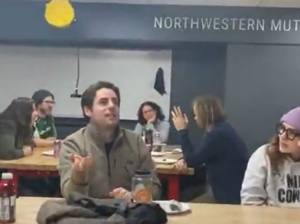What if students could see their work and stories impact the community?
 Collab Lab 53 attendees explored new or unexplored ways in which educators might enable students to share their voice and practice advocating for a cause they believe in. They explored:
Collab Lab 53 attendees explored new or unexplored ways in which educators might enable students to share their voice and practice advocating for a cause they believe in. They explored:
- What experience(s) can we offer to give students a story worth telling?
- What do students need from those experiences to have a story worth telling?
- What are the assets we can draw upon to help students tell effective stories/share their work?
Experiences we can give
We surfaced 4 major themes as we introduced examples of impressionable storytelling to each other at our tables
Creating an inventory of experiences
Our attendees this evening first discussed an often overlooked aspect of storytelling: In order to be able to tell a story with conviction, passion etc. you need to have experienced it or something like it. How do you create space in your approach to teaching to start building that inventory of experiences? What experiences should you prioritize on, because they are new or unique and not part of the reference context that students bring to your classroom?
Discovery and Identity
Many teachers may have students in their groups that do have a lot of personal experience with certain issues, such as food insecurity or housing instability. Those experiences have certainly contributed to identity development of the individual student. That offers the opportunity to explore what that identity is and how the identity of the narrator influences the telling of the story. What are the biases that the storyteller may bring with her that may present a certain perspective. How do I as a teacher create opportunities to explore identity and bias in story telling and enable students to practice?
Using animals as proxy to tell the story
What would happen to the strength, color, impact of the story one narrates if we put ourselves in the place of an animal proxy? Will the story become more interesting to our audience because we take the human identity out of the equation? How can we as teachers encourage students to step outside their identity and tell the story from a (neutral) point of view?
Talking WITH the person, not ABOUT the person
And lastly, we can make our story more engaging and impactful if we engage our audience in the process. That means learning how to consider the audience, the perspectives that the individuals in that audience bring to the room, and how we can be respectful towards them while we also have a position that may differ from theirs, at least at the start of the story.
What students need
Before we get to the technicalities of developing a great story, we need to understand what many of our students need in order to get to a place where they feel safe and trusted enough to want to explore that. Many have been ‘burned’ by people in their environment (including sometimes teachers) in their interactions to the extent that they are confused and distrusting of intentions. Layer on top of that the many voices that are generated through access to technology, and by technology (Bots, AI, etc.)
If we want to create space for student practice in storytelling and advocating for their interest (or that of their community or group), how do we as teachers recognize our students’ needs? How do we create our own space to learn and practice, knowing that the pacing guide dictates what we should be teaching, when?
- Authenticity of exposure
- Trust
- Safety – safe spaces
- Passion for an issue – connection to an interest, their world
- Opportunity and time to reflect
Assets
All humans have a need to share through storytelling
What students bring:
- Rapidly building life experiences
- Developing identity (with a lot of uncertainty)
- A curiosity about the world they are experiencing
What we can provide them:
- Interest in hearing them individually
- Ability to assemble resources, create experiences
- Structure through Process:
- Engineering and scientific process
Are you actively experimenting with ways in which you can guide your students into deeper learning about the various stories they might consume and how they need ‘listen’ to them?
We’d love to hear about your experiences!
Need some support and guidance as you start to explore what you can do for your students? Let’s explore some experiments that you can try without a lot of planning time.
Consider sharing your experience so far by joining the Collab Lab space on our Collaborative Learning Community ‘inspirEd’. Check it out, we’d love to welcome you into the inspirEd Community
Thanks go out to
Our featured guests:
- Katie Felten – CEO and Brand Strategist, Strategy House
- Marissa Jablonski – Executive Director, Freshwater Collaborative of Wisconsin
Supporting organizations:
- MSOE for use of their space at WE Energies STEM Center
- Northwestern Mutual for sponsoring the NM classroom at MSOE STEM Center
Our next Collab Lab
Join a diverse group of Milwaukee community members who share a concern about the rising number of Milwaukee youth struggling with mental health challenges preventing them from successfully participating in their education.
Collab Lab 54: Student Led Collaboration to Address Youth Mental Health

 We hosted over 30 excited education professionals from 10 Milwaukee area districts to connect during our fourth
We hosted over 30 excited education professionals from 10 Milwaukee area districts to connect during our fourth 

